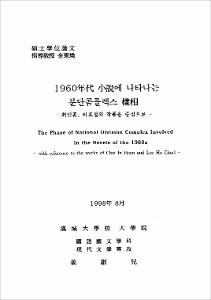1960年代 小說에 나타나는 분단콤플렉스 樣相
= The Phase of National Division Complex Involved in the Novels of the 1960s : with reference to the works of Choi In Hoon and Lee Ho Churl
- Type
- Thesis
- Alternative Title
- 최인훈, 이호철의 작품을 중심으로
- Department
- 國語國文學科現代文學專攻
- Issued Date
- 1998
- Publisher
- 漢城大學校 大學院
- Files in This Item:
-
-
Download
 000000065909.pdf
기타 데이터 / 2.91 MB / Adobe PDF
000000065909.pdf
기타 데이터 / 2.91 MB / Adobe PDF
-
Items in Repository are protected by copyright, with all rights reserved, unless otherwise indicated.